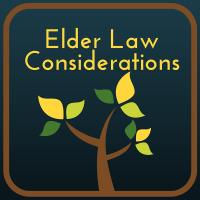|
|
Elder Care
Thursday, March 12, 2020
If you or a loved one has been turned down for long-term care insurance, cannot afford the premiums for the long-term care insurance, or believe that you will apply for Medicaid in the future, then you should consider Medicaid Planning. When you apply for Medicaid, any gifts or transfers of assets made within five years of the date of application are scrutinized and subject to a penalty. This is referred to as the “lookback” period. That penalty is based on the dollar amount of the transferred assets divided by the average monthly private patient care rate, the resulting number translating to the amount of days or months that the applicant is ineligible for Medicaid. Read more . . .
Thursday, May 2, 2019
3347.png) In the United States, six out of ten adults in the United States have a chronic disease, and chronic disease is the leading cause of disability and death. While many healthy adults view estate planning as a contingency plan, adults with a chronic illness approach estate planning with higher urgency. While preparing their plan, adults with chronic illnesses should assemble a “team” of advisors. An attorney can draft important financial and health documents, such as your: - Will or Revocable Living Trust: Expresses your wishes regarding your property after you pass away;
- Durable Power of Attorney: Appoints an agent to make your financial decisions if you cannot do so;
- Medical power of attorney: Appoints an agent to make your medical decisions if you cannot do so;
- Living Will: Expresses your preferences for life support;
- HIPAA Authorization: Allows family members to know your protected healthcare information;
- Out of Hospital Do-Not-Resuscitate Order: Informs paramedics not to use a cardiac defibrillator if your heart stops.
These documents will enable you to empower a trusted person or group of people to care for you when you are unable to do so. Read more . . .
Tuesday, April 9, 2019
 Personal injury lawsuits can include years of litigation, so when a plaintiff receives a settlement in a personal injury case, he or she might believe that everything is resolved. However, Personal injury lawsuits can include years of litigation, so when a plaintiff receives a settlement in a personal injury case, he or she might believe that everything is resolved. However,
Read more . . .
Monday, October 31, 2016
3153.jpg)
Joint Bank Accounts and Medicaid Eligibility
You may be in the process of assisting an aging parent in need of nursing home care. There are many regulations and eligibility requirements to obtain governmental assistance to help pay for their care. Consultation with an elder law attorney is critical before proceeding to making sure actions are not taken that would penalize them from getting the care they need.
Like most governmental benefit programs, there are many myths surrounding Medicaid and eligibility for benefits. One of the most common myths is the belief that only 50% of the funds in a jointly-owned bank account will be considered an asset for the purposes of calculating Medicaid eligibility.
Medicaid is a needs-based program that is administered by the state. Therefore, many of its eligibility requirements and procedures vary across state lines. Generally, when an applicant is an owner of a joint bank account, the full amount in the account is presumed to belong to the applicant. Regardless of how many other names are listed on the account, 100% of the account balance is typically included when calculating the applicant’s eligibility for Medicaid benefits.
Why would the state do this? Often, these jointly held bank accounts consist solely of funds contributed by the Medicaid applicant, with the second person added to the account for administrative or convenience purposes, such as writing checks or discussing matters with bank representatives. If a joint owner can document that both parties have contributed funds and the account is truly a “joint” account, the state may value the account differently. Absent clear and convincing evidence, however, the full balance of the joint bank account will be deemed to belong to the applicant.
If you are considering Medicaid for a loved one, it is important to seek expert advice on how to deal with assets and income correctly. Preplanning or a strategic crisis plan can make the difference between qualification and disqualification.
Monday, October 24, 2016
5581.jpg)
Do I Really Need Advance Directives for Health Care?
Many people are confused by advance directives for health care. They are unsure what type of directives are available and whether or not they need directives at all, especially if they are young. There are several types of advance directives. One is a living will, which communicates what type of life support and medical treatments, such as ventilators or a feeding tube, you wish to receive. Another type is called a medical power of attorney. In a medical power of attorney, you name another person to make health care decisions for you in the event are unable to do so for yourself. A third type of advance directive for health care is a do not resuscitate order or a DNR. A DNR is a request that you not receive CPR if your heart stops beating or you stop breathing.
If you are 18 or over, it is time to establish your health care directives. Although no one thinks they will be in a medical situation requiring a directive at such a young age, it happens every day in the United States. People of all ages are involved in tragic accidents that could not be foreseen which result in the use of life support. If you plan in advance, you can make sure you receive the type of medical care you wish, and you can avoid a lot of heartache for your family, who may be forced to guess what you would want done.
Many people do not want to execute health care directives because of some common misperceptions about them. People are often frightened to name someone to make health care decisions for them, because they fear they will give up the right to make decisions for themselves. However, an individual always has the right, if he or she is competent, to revoke the directive or make his or her own decisions. Some also fear they will not be treated if they have health care directives. This is also a common myth – the directives and medical power of attorney simply inform caregivers of the type of treatment you would like to receive in various situations and the person you designate to make health care decisions if you cannot. Planning ahead can ensure that your treatment preferences are carried out while providing some peace of mind to your loved ones who are in a position to direct them.
Tuesday, July 19, 2016

Life insurance can be an integral part of an estate plan. Policies can be set up to be paid directly to the beneficiary without the need to pass through the probate estate, and may be put in place as part of an overall strategy to pass wealth on to family. Life insurance proceeds transfer to the beneficiary without having to pay income tax and with proper planning, may also avoid the estate tax. Having life insurance ensures that some assets will be liquid, so that non-liquid assets, such as real property, will not have to be sold to pay estate debts, expenses or the estate tax. An attorney can set up a life insurance trust to avoid estate taxes on the proceeds.
Read more . . .
Friday, May 20, 2016
 Have you ever heard the term “Enhanced Life Estate Deed” or “Lady Bird Deed”? Many have heard these terms, but may not understand what this document is or what the purpose of having such a deed would be.
Establishing a life estate is a relatively simple process in which you transfer your property to your children or another beneficiary, while retaining your right to use and live in the property. Utilizing an enhanced life estate is different from a traditional life estate. Life estates avoid having to probate the property while maximizing tax benefits. An enhanced life estate also provides these benefits, but further protects the real property from potential long-term care expenses you may incur in your later years.
Read more . . .
Wednesday, April 27, 2016
A daughter taking over the care of her mother recently diagnosed with dementia goes to the bank to handle her bills, only to be turned away because she has no authority to handle her mother’s account. Imagine her frustration… Because her mother did not plan beforehand for her disability, the daughter’s only option now is a guardianship proceeding through the court.
One of the common documents that is part of an Estate Plan is the “Durable Power of Attorney.” What makes this document so powerful? Essentially, the designation of a Power of Attorney allows you to give financial decision-making power to someone you trust. You get the option of making it effective immediately, which may be beneficial for spouses, or to make it effective in the event of your disability. Read more . . .
Friday, March 4, 2016
 The high cost of long-term care has made planning a critically important issue for most middle class seniors and their families. In fact, most seniors will likely require some form of long-term care. Sadly, many of them are unprepared for the significant financial burdens it places on their family’s hard earned savings. While some seniors are able to afford private pay care, the cost of long-term care will wipe out savings of all but the wealthiest families in a matter of years. Those who have planned ahead by purchasing long-term care insurance have a degree of certainty and peace of mind, knowing that they have a lesser need to rely on other sources in the future. Unfortunately, many can’t afford the high cost of long term care insurance or worse, because of age or medical condition cannot qualify for long term care insurance altogether. If you do have long-term care insurance, you should be aware of what your policy covers. Many policies have high deductibles or provide for only a short period of care in facility. In fact, many who have long-term care insurance still have to resort to Medicaid to pay for their care. The other option to pay for care is Medicaid. A joint federal-state program, Medicaid provides medical assistance to low-income individuals, including those who are 65 or older, disabled or blind. Medicaid is the single largest payer of nursing home bills in America and serves as the option of last resort for people who have no other way to finance their long-term care. While Medicaid eligibility with respect to long-term care was not difficult in the past, there has been a steady drift towards more complex and restrictive rules. It’s no longer as easy as reviewing one’s bank statements. There are a myriad of regulations involving look-back periods, income caps, transfer penalties and waiting periods to plan around. Unfortunately, the advice given by well-meaning friends is often faulty, placing you or your loved one in a worse situation. Pre-planning can help avoid the financial ruin associated with the high cost of long-term care.
Tuesday, January 5, 2016
 Happy New Year! The chilly January breeze blows in with a sense of new beginnings, fresh starts, and goal setting. What better time than now to create a “New Year’s Resolution”, a tradition passed down for generations? As you think about what resolutions you wish to establish, consider making 2016 the year you institute your Estate Plan. While nobody wants to think about death or disability, establishing an estate plan is one of the most important steps you can take to protect yourself and your loved ones. Proper estate planning puts you in charge of decisions concerning your legacy, your finances and medical matters. It can also spare your loved ones the expense, delay and frustration associated with managing your affairs when you pass away or become disabled. Taking the steps to get Estate Planning documents prepared is a gift, not only to you, but to those you love. Regardless of the size of your estate, proper planning brings peace of mind. By taking action now, you can ensure your legacy is as you want it and your family’s needs are provided for when they need it most. As you start this New Year reflecting, dreaming, and considering your priorities, resolve to take this important step.
Friday, October 16, 2015
 Talking with aging parents about estate planning and finances may be one of the most difficult conversations to approach. Finances are an extremely personal topic, and each family relates differently with money.
- Approach the conversation with sensitivity and understanding.
Because this is somewhat of a role reversal, approaching the conversation with sensitivity and understanding is essential. Acknowledging that this is difficult for them brings a sense of compassion and understanding. Also, meeting at a time that is not pressured and a location that is low-stress can help ease the tension of the discussion.
- Consider how to bring up the subject.
Prepare for the talk. One way to approach it is to work on your own estate plan, and then explain to your parents that you are in the process of establishing your estate plan and ask them if they have theirs in place. Another idea is to approach the subject by sharing a story of a friend who has experienced the effects of not having these things in order. Expressing your concern and why you hope to communicate about the subject may help them be more willing to talk. Most importantly, emphasize you want to help ease any stress they feel about their future.
- Gather important documents.
Work on gathering important financial, medical, and estate planning documents. Knowing where they are kept and how to access them helps to avoid complications later. Consider consolidating multiple bank accounts and simplifying financial tasks, such as setting up automatic bill pay or deposits.
- Ensure their Estate Plan is in place.
If documents are not already in place, explain the importance of deciding how they would like their assets distributed, as well as who they would like to help them handle their finances and medical decisions. Powers of attorney can become vital if a parent becomes unable to make their own decisions. Having them in place before that time comes avoids the stress and extra expense of a court-order guardianship in an already difficult time.
- Communicate – something is better than nothing.
Communication is key. While it may be a process, start the conversation sooner rather than later. The difficulty only increases should a crisis arise. Rather than focusing on money, focus on determining what they value and finding ways to help them feel supported.
The Dean Law Firm, PLLC assists clients in Sugar Land, TX and throughout Houston in Fort Bend County and Harris County.
|
|
|
|